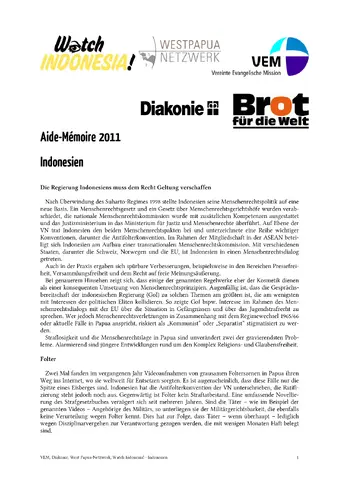- Publikationen
- Information & Analyse
- Pressemitteilungen & Offene Briefe
- Berichte & Petitionen
- Informations- und Bildungsmaterialien
Indonesien: Die Regierung Indonesiens muss dem Recht Geltung verschaffen
Oktober 2011
Aide-Mémoire 2011
Nach Überwindung des Suharto-Regimes 1998 stellte Indonesien seine Menschenrechtspolitik auf eine neue Basis. Ein Menschenrechtsgesetz und ein Gesetz über Menschenrechtsgerichtshöfe wurden verabschiedet, die nationale Menschenrechtskommission wurde mit zusätzlichen Kompetenzen ausgestattet und das Justizministerium in das Ministerium für Justiz und Menschenrechte überführt. Auf Ebene der VN trat Indonesien den beiden Menschenrechtspakten bei und unterzeichnete eine Reihe wichtiger Konventionen, darunter die Antifolterkonvention. Im Rahmen der Mitgliedschaft in der ASEAN beteiligt sich Indonesien am Aufbau einer transnationalen Menschenrechtskommission. Mit verschiedenen Staaten, darunter die Schweiz, Norwegen und die EU, ist Indonesien in einen Menschenrechtsdialog getreten. Auch in der Praxis ergaben sich spürbare Verbesserungen, beispielsweise in den Bereichen Pressefreiheit, Versammlungsfreiheit und dem Recht auf freie Meinungsäußerung. Bei genauerem Hinsehen zeigt sich, dass einige der genannten Regelwerke eher der Kosmetik dienen als einer konsequenten Umsetzung von Menschenrechtsprinzipien. Augenfällig ist, dass die Gesprächsbereitschaft der indonesischen Regierung (GoI) zu solchen Themen am größten ist, die am wenigsten mit Interessen der politischen Eliten kollidieren. So zeigte GoI bspw. Interesse im Rahmen des Menschenrechtsdialogs mit der EU über die Situation in Gefängnissen und über das Jugendstrafrecht zu sprechen. Wer jedoch Menschenrechtsverletzungen in Zusammenhang mit dem Regimewechsel 1965/66 oder aktuelle Fälle in Papua anspricht, riskiert als „Kommunist“ oder „Separatist“ stigmatisiert zu werden. Straflosigkeit und die Menschenrechtslage in Papua sind unverändert zwei der gravierendsten Probleme. Alarmierend sind jüngere Entwicklungen rund um den Komplex Religions- und Glaubensfreiheit. Lesen Sie den kompletten Bericht hier

